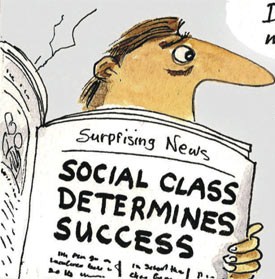 |
| Photo from wiki.ubc.ca |
Classism refers to prejudicial attitudes toward people based on their social class. Classism can lead to discrimination based on locally defined social class.
Researchers divide social classes in various ways. The classifications people use may include different attributes such as economic, cultural, and social capital / social influence.
Thinking of people in terms of class is a common experience. People seem to naturally classify people as rich, important, attractive, and intelligent, which has the effect of setting up contrasting categories as less than the valued class.
Some writers use a variation of a traditional five-part system:
Upper class or elite
Upper middle class
Lower middle class
Working class
Poor
A UK study classified people in the following classes (O'Brien, 2013)
Precariat- most deprived of economic, cultural, social capital
Traditional working class
Emergent Service Workers
Technical Middle Class
New Affluent Workers
Established Middle Class
Elite
Comments